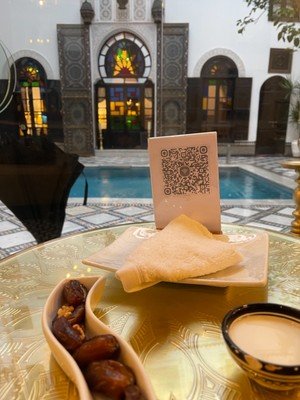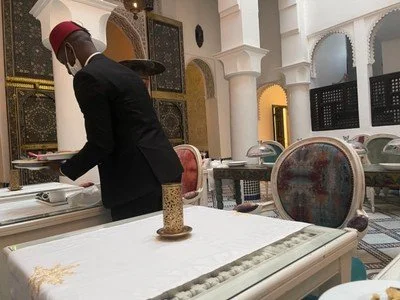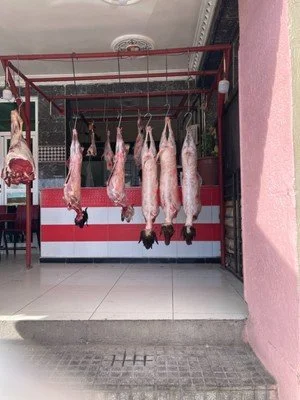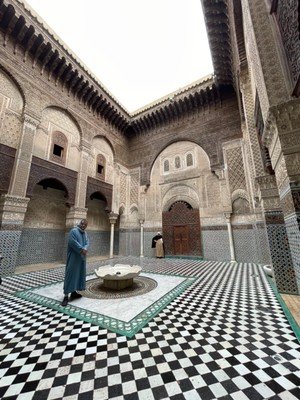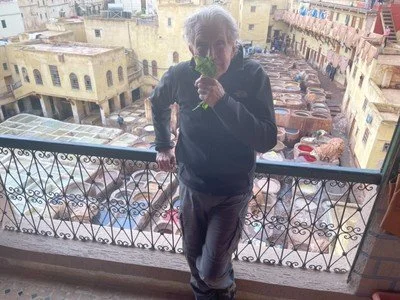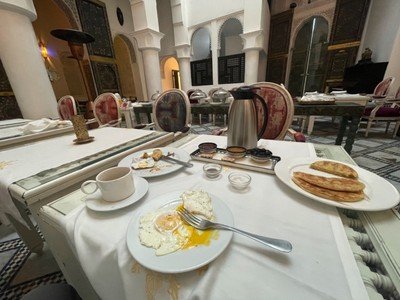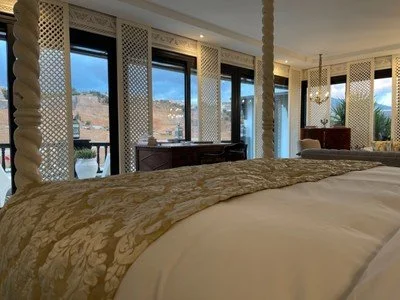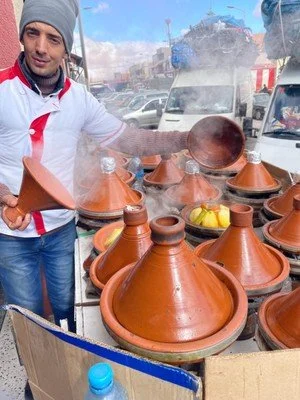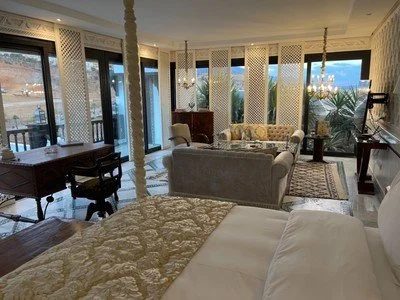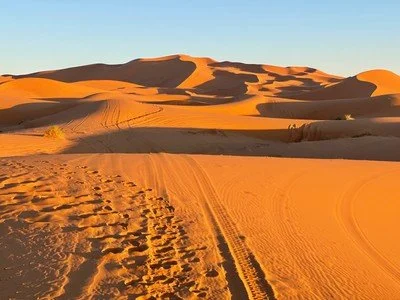Chapter Two: Driving Fes to Merzouga, Many Surprises EnRoute
An adventure detoured?
11.28.2021 - 11.28.2021 40 °F
View Morocco + Uganda + Rwanda on paulej4's travel map.
I had a fine breakfast and checked out of my hotel. Photos were not uploading yesterday due to a Travellerspoint site upgrade so I'll share pictures of the hotel now:
Today Ibrahim and I drive to Ifrane & Azrou & Zayda and cross the Atlas Mountains and Errachidia Gorge en route to Kasbah Mohavut and Merzouga.
The problem is that the road is blocked. Just beyond Ifrane, the snow has blocked the pass so Ibrahim has opted for a different route: the road to Bolmin. What was to be a long day in the vehicle just got longer. To begin with the road is older and hosts many potholes so the going is slow. Many vehicles are stopped by the side of the road apparently deciding that playing in the snow is preferable to driving in it. The landscape on the alternate route is flanked by recently harvested onions on one side and sheepherders on the other. I stopped to buy a kilo of onions for Ibrahim's family and another as a gift for the chef at tonight's hotel. Why not? The cost: 100 Moroccan dirham for both bags, about $10 U.S. The Russell Luck persists. We would not have been here were it not for a road closed by an unseasonable snowfall.
As I write, I got an email from Qatar Airlines telling me that my flight on Saturday from Doha to Entebbe has been canceled. Fortunately (and unlike what Qatar did to me on my last trip with them to Sri Lanka) there is an alternative albeit much later. My trip is interrupted but not interdicted.
Ibrahim and I are becoming more friends than just guide and client. He is very good at what he does. I am just beginning to understand his many talents as he reveals them in a methodical way as we become more friendly. He has begun to call me "brother" which is an honorific I am proud to claim.
As I ponder these two different impediments to my travel, I cannot, at least early in the drive, get Fes out of my mind. So, on this long drive and since I am in a vehicle with wifi, to help pass the time I will reminisce.
Fes is extraordinarily old. Founded in the 8th century. 500 years later the Mellah—Jewish Quarter—took root. Fes (or Fez if you prefer even though they insist on the "S") became the capital of Morocco in 1912. Now, there are two old medina quarters and a larger modern urban area dating from the French colonial era. The medina of Fes (the historical center and where I spent my afternoon yesterday) is one of the world’s largest urban car-free areas. Nicknames for it abound ranging from the “Mecca of the West” to the “Athens of Africa.”
Trouble happened after it was named the capital. French colonial rule was instituted and riots happened in the city. The uprising included attacks on Europeans and Jews which led to a period of deadly repression. The French resident general promptly moved the capital to Rabat. It remains so today.
Morocco regained its independence in 1956 when the “bourgeois class” moved to Casablanca and Rabat. Jews were “depleted” moving to Casablanca or fleeing to France, Canada and Israel. The reign of King Hassan II, known as the Years of Lead, lasted from 1975 until 1990. Riots commenced, thousands were arrested and five died. Social unrest knows no boundaries.
It is today a major tourist destination and, therefore, served as my first stop in this country. Parts of the yet to be titled Indiana Jones movie—the fifth in the series—is being filmed here (a crew member died in his hotel room early this month and made national news). I saw no sign of them.
The locals speak Arabic and Berber, Darija and French. Younger people are learning English. Islamic shrines contribute to the tourist draw. The Jewish quarter—the Mellah—is home to the 17th century Al-Fasslyin Synagogue and the Ibn Danan Synagogue among others but none of them are functioning today. Only 150 Moroccan Jews remain here. There is one Catholic church. I learned that thousands of Jews were once here, many involved in the gold trade. One of my stops was at Place Sffarine.
Kamal, shown here from yesterday, tied that word to Sephardic Jews indicating that those who were here came down from the Iberian peninsula.
The tanning industry has continually operated here since the early centuries. Today, it represents a major tourist attraction where visitors like me see round stone wells filled with dye or other liquids to soften hides. I took a photo there but was unable to upload it yesterday so here it is today.
The resulting leather is sold world wide. Another draw are bathhouses called Hammams. Built next to wells or springs, their design was inherited from Roman bathhouses. Those I was told of but did not visit.
But it is time to move on.
Ifrane is a small city located a mile above sea level established by the French just over 90 years ago. It’s a resort town where local people can escape the heat of the tropical lowland. Today though it is very cold. Onward on our new routing to a barbeque lunch at Zaida, a tiny way station on the way to Merzouga on the edge of the Erg Chebbi dunes—the reason I am here. The French Foreign Legion build a lot of this place between 1916 and 1932.
The Zaida restaurant is a delight where the lentils and barbecue and wheat bread and mint tea are very fine. It is a local place not so much for tourists and that is why I liked it so much. Ibrahim has friends here so, I now have friends here as well.
In case you are wondering why the animals' heads are left on the butchered carcass it is so that the person who demands to buy goat meat can be assured that what they are buying is, indeed, goat meat and not something else.
It is four hours more over the Middle Atlas Mountains to Errachidia and our destination with a stop for strong coffee along the way. I wrongly assumed that the name Middle Atlas Mountains referred to the section between the North and the South Atlas Mountains. Not so; It is the section between the High and the Low Atlas Mountains. Now you know too.
I was to be staying at Kasbah Mohayut, in a rural spot near the edge of the Sahara. There is an outdoor pool, a rooftop terrace and a garden and a chef happy to be receiving the gift of a kilo of onions. I was to be in what is known as a private riad, a guesthouse type accommodation. I say "was to be" because around 4:00pm local time, a bit of mayhem broke loose due to the Omicron Variant of the Coronavirus and the reaction of governments around the world, including the Moroccan government.
Ibrahim suggested I go immediately to the desert camp rather than the hotel. The reason, and he is continuing to look after my interests, is that if travel restrictions are imposed, he can swiftly get me to some evacuation airport without me having missed the reason I came to Morocco in the first place: to spend a night in a tent in the desert. It is too late for me to get to any airport tonight so we go to the tent and save the hotel for tomorrow night rather than go to the hotel and hope for the tent. Did that make sense?
It was a race against the sun. It would be pointless to arrive at the Sahara Desert tent after dark. As B will tell you, an ocean view after dark (if there is no illuminating moon) is no view at all. The same is true for the desert. It is black. Nothing but black.
So we drove the speed limit to say the least. We met the handoff vehicle, a 4x4, at an intersection. I transferred to it and then began an only slightly bumpy ride over packed sand for about ten minutes. At the edge of the dunes, I met Mohammed who led me to my camel. The sun was still high enough in the sky that nothing was to be lost. As I mounted the saddle on the camels back, either I did something the camel didn't like or the saddle slid and the camel bolted while I fell to the ground. Did you know that your Apple Watch knows when you fall and asks you if you're OK? Well, it does. The camel took off but only for about 30 yards or so when Mohammed caught up to it, re-saddled it and I jumped aboard. Off we went. Mohammed led my ride for about a half hour over the dunes which were devoid of all sound save for another couple of tourists far off in the distance.
I have ridden camels before but never so solo. It was quite nice. The light from the low setting sun casts shadows that clearly divide the sides of sand crests, creating beautiful patterns. There were tracks here and there. Dune buggies ply this same space but there were none while I was there thankfully saving me from noise pollution even through they did create dune pollution by leaving tracks in their wake. I recommend a solo camel ride in the Sahara should one ever been offered to you.
Upon arrival at my tented camp, Paradis Du Sahara Erg Chebbi Dunes, it was confirmed that I was the only guest. This happened to me on my recent visit to Sri Lanka--being the only guest in camp. It is a mixed blessing at mealtimes because there is no one with whom to converse, to swap travel stories, to ask "Where are you from?" and "What do you do?" and all those other questions posed to strangers one meets far from home.
My travel arranger at Wanderlust Voyages, Megan, is married (I learned) to Bill who arrived here to meet me and with whom I shared a glass of local red wine. Bill reiterated the difficulty facing me with the Omicron variant now front page travel news. It seems that tomorrow at 11:59pm, the government of Morocco may be closing its airspace to some--or maybe all--flights both in and out to some--or maybe all--countries. It is a ten hour drive from here to Casablanca. The roads are dark and two lanes wide. The Qatar flight tomorrow to Doha--the one I am booked on in a few days--if it even operates leaves at 3:10pm. International flights require a three hour before takeoff check in.
Do the math. I would have to leave the Erg Chebbi Dunes no later than 1:00am to make it. Then, if I made that flight, I would be in Qatar, wondering if I could make it on to Uganda or face the prospect of attempting to fly back to the U.S. If I cannot get to Uganda, the primary reason for this trip is lost. As of this moment, Qatar assures me that their flight in four days--the one I am scheduled to be on--is confirmed and will operate. Even if it doesn't, maybe there is a flight day after tomorrow which I could more easily and safely make. What to do?
I'm staying. Good decision or mistake? Stay tuned.
